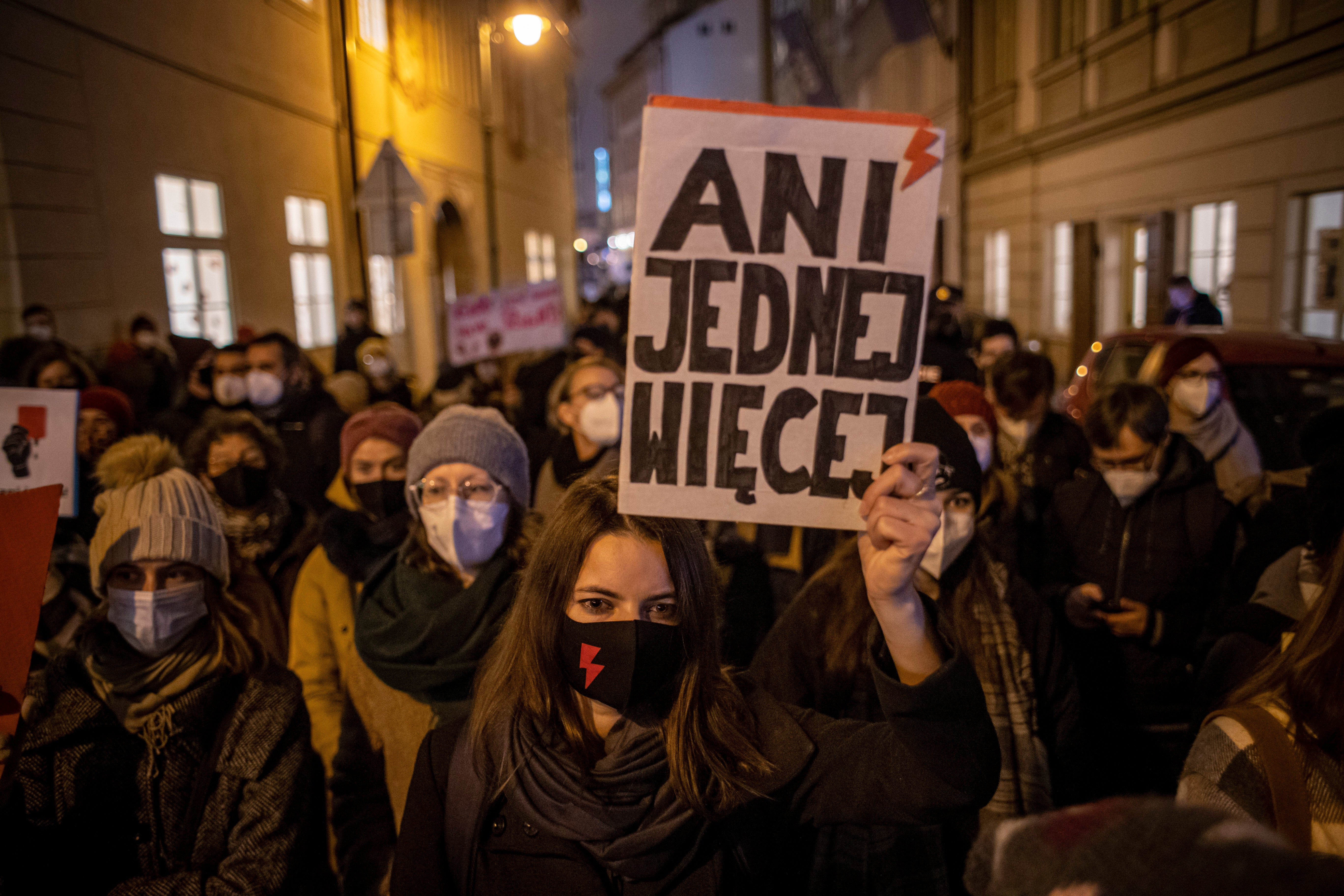The rise of the Czech Republic’s anti-abortion movement
As debate over abortion roars elsewhere, Prague is now faced with own simmering culture war

Progressives heralded the start of a new era when the Czech Republic replaced a populist regime with a pro-EU government in elections last October. Yet strong currents of social conservatism are now emerging under the new coalition, leading rights campaigners to draw uneasy parallels with regional allies Poland and Hungary.
A simmering culture war burst into the open in April, when the anti-abortion Movement for Life caused an outcry with a now-deleted Facebook post suggesting Ukrainian women raped by Russian soldiers should be sent self-defence equipment instead of the morning-after pill.
“Why don’t Czechs contribute to the purchase of air horns, pepper spray or electric stun guns instead?” it complained.
The suggestion provoked incredulity, but Movement for Life has become one of the Czech Republic’s most powerful political lobbying groups. Amid anger over its stance on rape in Ukraine, it held a march through Prague attended by thousands.
Tensions subsequently ratcheted up a notch with revelations that the government is cooperating with Movement for Life and employing members of another social-conservative group, the Alliance for the Family, in advisory roles.
Alliance for the Family promotes traditional notions of marriage running contrary to popular opinion. Two-thirds of Czechs support the legalisation of same-sex marriage, but the Alliance wants marriage to be enshrined as a male-female bond in the constitution, as happened in Hungary in 2020.
Filip Milde, from the We Are Fair LGBT+ rights group, suggests the Alliance for the Family’s new political clout is a blow against western values – a bitter irony as the Czech Republic takes Russia’s place on the UN’s Human Rights Council.
“These ultra-conservatives are importing the rhetoric of the Kremlin, in which a decadent west has ‘parent one’ and ‘parent two’ replacing the mother and father,” he told The Independent.
Alliance for the Family wants to choke off state support for “ideologies that undermine the role of the family and deny the natural complementarity and uniqueness of men and women”. Its deputy head is an adviser at the Ministry of Justice, while members also form part of a working group on family policy at the Ministry of Labour and Social Affairs.
The government claims it is merely consulting opinions from across the ideological spectrum, but Milde thinks these appointments confirm the illiberal tendencies of the prime minister Petr Fiala’s ODS party, which he describes as “a big fan of Poland’s Law and Justice government”.
The parallel with Poland – where a crackdown on abortion and LGBT+ rights is advanced – is striking because Polish Christian conservatism exists in such a different social environment. Some 86 per cent of Poles are Roman Catholic, compared with only 7 per cent of Czechs.
The relative absence of religion as a popular force in the Czech Republic makes the LGBT+ pushback surprising. The contradiction is clearer still on abortion, which is legal on any grounds but subject to attack from Movement for Life, which wants “to change the culture in our country so that killing unborn children is seen as equally unacceptable as killing Jews or throwing wheelchair users off a cliff.”
Johanna Nejedlova, from the Konsent women’s rights group, told The Independent there’s “currently no evidence of financial cooperation” between Movement for Life and the Church. Movement for Life says it does not accept money “from the state, Church or foreign entities”. Yet its ideological kinship with the clergy is clear.
While inviting people to Movement for Life’s march through Prague, Archbishop Dominik Duka defended the organisation’s stance against emergency contraception for Ukrainian women. Duka urged understanding for Russian rapists as “victims of the strongest emotions and passions” and implied that self-defence might be a more “heroic” option for those faced with rape, saying “it cannot be seen as the only solution not to oppose the aggressor”.
Politicians and celebrity supporters professed shock at such sentiment, but Movement for Life has never been vague about its intentions.
It puts a mission to “lobby for life so that the state does not harm children conceived unexpectedly” front and centre. When asked by The Independent whether its objectives are being misrepresented, a spokesperson said: “We don’t comment on the opinions of others: we help women who are unexpectedly pregnant and want to give their unborn child a chance, but feel compelled to have an abortion.”
The organisation makes itself palatable through slick modern presentation, fronting its campaign with ubiquitous pictures of a compassionate, smiling woman plastered on billboards and bus stops. This is part of a conscious move to “secularise” its image to be “more acceptable to Czech society”, according to Nejedlova.
Christian-conservative groups are meanwhile replicating tactics used by progressive rights campaigners. Alliance for the Family is “copying what we’re doing and what we’re saying, mimicking the system of civil society involving NGOs and activists,” says Milde. The “pro-family” group admits this, saying “we learn from them [LGBT+ groups] and understand that if we are to achieve our aims, families also need to be a strong interest group.”
But Milde insists that unlike progressive rights groups, these social-conservative organisations lack transparency.
Artful mimicry has facilitated the rise of socially conservative lobbyists under a Czech government with a dogmatic Catholic strain. Behind a cosy secular image, hard-line groups may have finally worked themselves into a position to mould Czech society in their own image.






Join our commenting forum
Join thought-provoking conversations, follow other Independent readers and see their replies
Comments